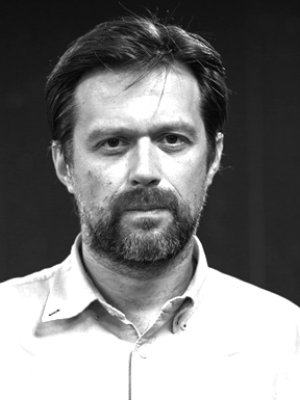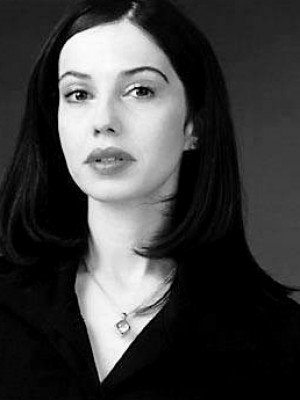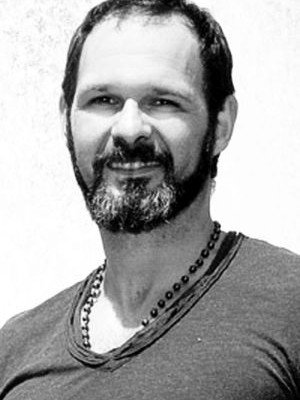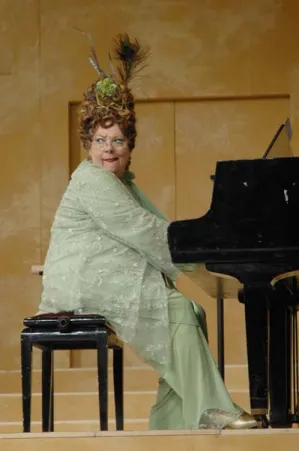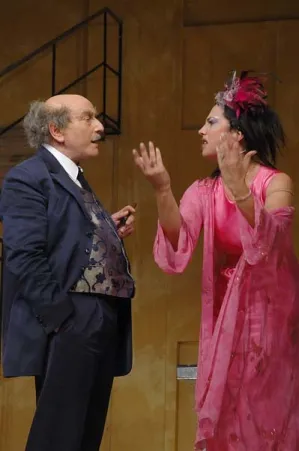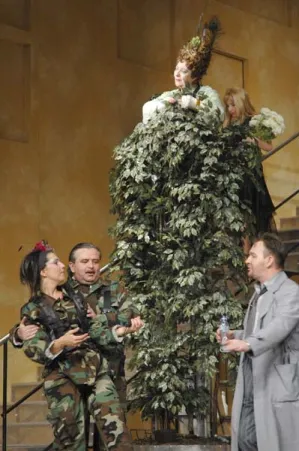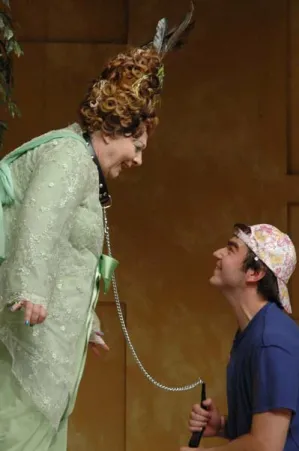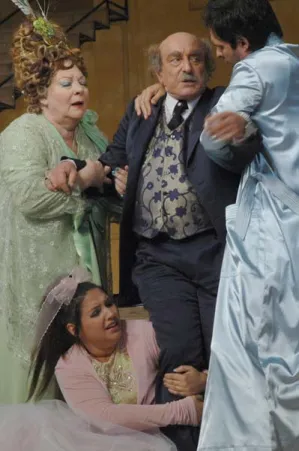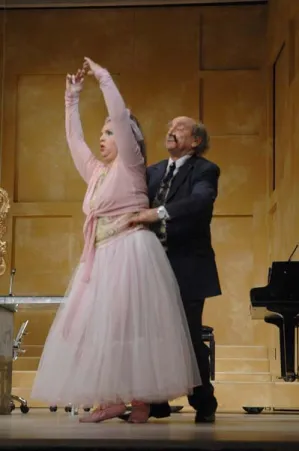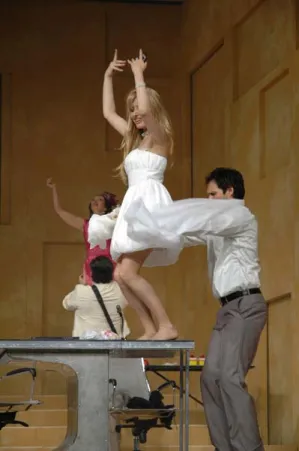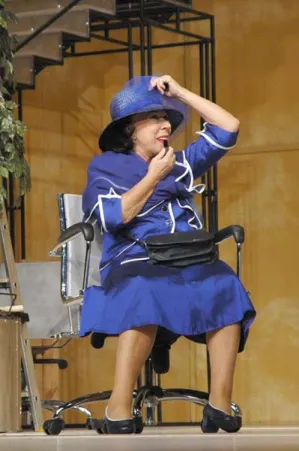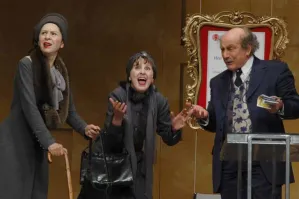Ph.d.
drama by Branislav Nušić

PH.D. AT THE NATIONAL THEATRE STAGE
Ph.D. is one of those few Nušic’s comedies produced by the National Theatre of Belgrade only once – premiere was held on December 17, 1936. However, this was not the first performance: the piece had been already produced by some of our provincial theatres. Although rarely loyal to the author, critics held the theatre management responsible for such a situation. Josip Kolundžic, a director, received approval from the critics. It was noted that he “proved to be excellent in Nušic’s characterization” and that he managed to escape “to overload the performance with unnecessary details”, establishing his concept on situation comedy and on highlighting satirical elements in the play. But, the critics noted that the said could be applied only to the first part of the play; in the second part caricature and farce were dominant. Set and costume designers were not listed in the theatre bill. The roles were assigned to the favorite “Nušic’s actors”: Dušan Radenkovic (Života Cvijovic), Teodora Arsenovic (Mara), Viktor Starcic (Milorad), Miss. Cvetanovic (Slavka), Fran Novakovic (Uncle Blagoje), Anka Vrbanic (Ms. Spasojevic), Milica Bošnjakovic (Ms. Protic), Zora Zlatkovic (Ms. Draga), Mata Miloševic (Velimir Pavlovic), Jovan Ðedo Antonijevic (Ph.D. Rajser), Velimir Boškovic (Nikolic), Žanka Stokic (Sojka), Ðura Marinkovic (Husband to Sojka), Marica Popovic (Klara), Mica Koncan (Pepika), Miss. Voljenac (Girl with a bunch of flowers), Miss. Markovic (Marica) and Dušan Het (Piccolo). Some of the critics, specially praised thoughtful and psychologically justified interpretation of young Mata Miloševic, others found that the most outstanding were Žanka Stokic and Dušan Radenkovic, “the two actors who have been fully realized in Nušic comedies”. Fran Novakovic was complimented to be “more than brilliant” for creating a real “acting masterpiece”. The rest of the ensemble was also well judged. The performance stayed in repertoire until the occupation and, during those four- and-a-half seasons, was presented to an audience 82 times.
Jelica Stevanovic
 BRANISLAV NUŠIC
BRANISLAV NUŠIC
(Belgrade, 1864-1938) was the most famous comediographer and storywriter of the first half of the twentieth century, the most prolific author of the time, great conversationalist, and brilliant master of ceremonies. He attended primary school in Smederevo, high school in Belgrade, and the Law School in Graz and Belgrade. He started his career in civil service as an official in the Ministry of Foreign Affairs. He spent nearly ten years as a clerk of consulate in Macedonia and Old Serbia. His last post in this region was vice-consul in Priština. In 1900 he became a dramaturge of the National Theatre of Belgrade. Later, he was retired from his job and soon after moved back to civil service employment, but on the other duties, and afterwards finally retired for life. For some time, he held the position of a head of the Serbian National Theatre. He also worked as an editor for various magazines and feuilletonist for Politika, under the pseudonym of Ben Akiba. On two occasions he was an editor of magazine Zvezda (A Star), first along with Janko Veselinovic, then along with Pavle Marinkovic. In 1912 Nušic was appointed the first district chief of the newly liberated Bitolj. In 1913, he created a theatre in Skopje and became its first superintendent, he stayed on that duty until 1915: at the same time he was an editor for the magazine Srpski Jug (The Serbian South). During the First World War, he passed through the Albanian Golgotha, then fled the country, and lived in Italy, Switzerland and France. After the war, Nušic was appointed the first head of the Art Department of the Ministry of Education, then head of the National Theatre in Sarajevo and librarian of the National Parliament. Like most of the young poets, he began his literary career writing poetry, but soon after devoted himself to prose, mainly to playwriting, achieving his greatest success in comedy. Nowadays, the audience eagerly attends his plays. Some of his comedies became classics during his lifetime, and it was even then obvious that they would outlive their creator. Nušic’s works have been translated into numerous foreign languages. During his 50-year career, Nušic wrote many pieces of all genres: comedies, dramas, revues, stories, feuilletons, anecdotes, and itineraries. Comedies: Parliamentarian, Suspicious Person, Protection, Cabinet Minister’s Wife, An Ordinary Man, Social Circles, Mister Dollar, Belgrade – then and now, The Bereaved Family, The Deceased, SYEW (Society of Yugoslav Emancipated Women), Ph.D., Travel Around the World, Authority (finished by Mile Stankovic); shorter pieces: Illiterate Person, Schopenhauer, Our Children, A Rent, A Fly, A Mouse, A Cold, A World War, A Swine; dramas: It Had To Be That Way, Prince Ivo of Semberia, A Foundling, Duchess of Tribal, Hadži Loja, A Stranger, In a God-forsaken Place, Heartless Woman, The Open Sea, The Autumn Rain, Tomaida, The Blood Tax, Rastko Nemanjic, Dangerous Game, Passion Week; prose: The Corporal’s Stories, Leaves, Ramadan Evenings, Tašula, Community Child, Ben Akiba I, II, III, Year of 1915; Stories I, II; Autobiography, Rebellions; itineraries: From Kosovo to the High Sea, By the Coast of the Ohrid Lake, Kosovo.
Taken from: From the Nearness of the Writers by Siniša Paunovic, Prosveta, Belgrade, 1958
 Jagos Markovic – director
Jagos Markovic – director
INSTEAD OF A BIOGRAPHY
I am so very honored and proud to have been appointed to present to Jagoš Markovic “Mica Popovic” Art Award from the Fund for the Promotion of Creativity. By his black canvases, films, books, public activities, as well as by his whole life, Mica Popovic was a challenge and a provocation. In another way, Jagoš Markovic is also a challenge and a provocation, by his specific, fantastic, wild, reach theatre. When working on a play, Jagoš always makes something that no one before him has ever done. He throws new light even on the old and already known issues. He succeeds in that by using some unnoticeable gesture, but with that gesture he changes everything. Jan Kott once wrote Godot in small g, thus transforming the name of man or God into the name of term. In that way he gave it unexpected meaning, unexpected domain and volume, as well as unexpected consequence. Jagoš uses the similar procedure: his Miser does not count, nor fondle, nor hug, nor devour golden coins, but glass balls. Through those glass balls the classical drama and the classical problem is turned into an unexpected direction. Radically, by his great courage, Jagoš changes the metaphors found in the text. However, he does not do that only as a director, for he is not only a director in the theatre. In fact, he is everything in the theatre: he is an actor and a whole ensemble, he is the audience, the stage and the theatre box, the first, the second and the third gallery, he is the theatre library, he is the brush and the paint, the hammer and the nail, the ropes and the lights, the silk and the fire, the sets and the curtain. Probably, he is all of that only to show us that the world without love is only dry, salt and lifeless sea bottom, which is the same what apostle Paul says in The First Epistle to the Corinthians. Tonight we are bestowing “Mica Popovic” Art Award to the man who is the whole, alive theatre, theatre without intermission, theatre without working time, theatre that never closes its door nor put out its light. Jagoš Markovic deserves this award in the same way as Mica Popovic deserves that this award bears his name; because of his gift, given by God, but which must be realized on his own, without God’s help, with the highest persistence and exclusivity serving only to that he loves and believes in.
Ljubomir Simovic, Chaos Gallery, June 12, 2004.
NUŠIC AND JAGOŠ ARE BOTH GREAT ARTISTS
Ph.D. produced by the National Theatre of Belgrade is the third Nušic’s play directed by Jagoš Markovic. I can hardly remember A Suspicious Person produced by the National Theatre of Sombor in 1998, however Cabinet Minister’s Wife I know in details, since in 2003/2004 season I worked as a dramaturge on that play. Now, I am eager to see his Ph.D. In fact, Jagoš Markovic doesn’t really need a dramaturge. He shortens and lengthens a text on his own, defines approach to the text and to the author, personally explains all the requirements and objections to his ensemble. Why then, periodically, he engages a dramaturge to work with him? It is absolutely clear to me. He needs someone to support him in some of his provocative ideas, to correct certain detail, to write a text for the programme, to announce his instructions to actors and set designers, and to admire him. I am good at everything mentioned above; for me it is not difficult to admire him, because I enjoy his way of directing, his way of rehearsing, his cooperation with designers and composers, and his way of protecting the rights of his team in front of management personnel. Jagoš’s rehearsals are performances for themselves, the same as it was with Stupica and Belovic. Even older actors, a little bit tired of theatre, who routinely do their job for a director of lesser capacity, enjoy his rehearsals. Jagoš’s vividness and joy of creation arise in them old passion for theatre. With Jagoš, dramaturge can achieve the best results if before the start of rehearsals provides him with written professional opinion how to read the author and the piece, in this time and in this place. Jagoš then analyzes text at home, and takes from it what inspires him. When rehearsals are in advanced phase, it is also possible to interfere in his work with actors. No matter how possessed by the demon of his gift, he clearly recognizes objections referred to the actor: “Exaggerating!” “ Where’s the character?” “What an affectation!”…You haven’t yet finished the sentence, Jagoš, if finds that you are right, straightway reacts with all the intensity of his temperament. When we worked on Cabinet Minister’s Wife, in two pages I have paid his attention on my text about Nušic written for the Zbornik in 1964, on the occasion of marking the 100th birth anniversary of great writer. I quoted myself: “Nušic’s cheerfulness, cheerfulness in spite of satirical elements is now forever shaded by Ionesco or Beckett…This should not be understood as an attempt of identifying Nušic with Beckett or Ionesco, but as a way of realizing how modern he is; how in forms and paradoxes of his humor there is something immanent to humor in contemporary literature … Nušic’s comedies are forever touched by absurd emotion as a possible source of laughter… With his immense cheerfulness, Nušic always overcomes gloominess, even when it implies pessimism… Nušic emerges in a world crying for optimism, cheerfulness, even for forgiveness by means of laughter…”
Apart from this text, at the first rehearsal of Cabinet Minister’s Wife I have told the cast my experience from the rehearsals of a play produced by the Yugoslav Drama Theater, probably the highest valued interpretation of Nušic after the Second World War. It was the 1955 version of The Bereaved Family, the first play by Nušic produced by that prestigious theatre, directed by Mata Miloševic. Almost eight years the YDT was hesitant about putting in its repertoire this classical author of Serbian comedy. General opinion was that he was too humorous, even shallow, as Velibor Gligoric, loudspeaker of the “Politika” during the interwar years, often wrote about him. In the spirit of social chronicles he wrote for Politika daily, Gligoric was of the opinion that Nušic should be more satirical, more critical, and more cynical towards Serbian citizens. Mata Miloševic, who himself was not fond of entertaining humor, tried to portray Nušic’s provincial family in the darkest tones possible. Their materialism is stronger than any family “mourning”. Greediness is their common trait that annihilates their individuality, although each of them shows its own initiative. In the manner of his “styled realism”, Mata Miloševic transforms that common trait into collective reaction of family members. But what a disappointment! Humor, greatly valuable verbal humor favored by an audience eversince Nušic’s plays appeared on our stages, by the end of the nineteenth and at the beginning of the twentieth century, was completely lost. Also another absurd emerged: Velibor Gligoric, who was so sharp in his criticism of Nušic’s verbal humor, helped Mata Miloševic, director, to make a brilliant piece, by recommending him to emphasize Nušic’s main instrument – verbal humor. I like to think what I told Cabinet Minister’s Wife cast was important to them, although I know that Jagoš would never quit humor, on behalf of searching for the dark sides of Nušic’s characters. I don’t know why I am so attracted to the principle that it is a good thing if in the most humorous play there is a bit of dramatic, even dark, satirical element. It reminds me of gastronomical principle I heard from the best chefs, that in every sweets small pinch of salt should be added, and in every salts small pinch of sugar. Salt and sugar emphasize basic taste of food. Best evidence that Jagoš’s Cabinet Minister’s Wife is not a performance of mere fun and humor is the fact that management of the “Dramaten” was delighted when they saw it in Belgrade. They invited it to Stockholm, and the performance had a great success. When I visited Dramaten recently, I was told that Swedish audience and critics were so enchanted by deep introspection found in Serbs when they criticize themselves. It sounds almost just like definition of satire. And as a result, they gave him a chance to put on a stage Strindberg’s Queen Christina. Following a principle of opposite elements I’ve just explained, I noticed several witty elements in the midst of dramatic theme treating power and irrationality of human nature, which greatly occupied famous Nordic writer. And now I am writing text for the programme of Ph.D. although I haven’t discussed with Jagoš anything about his third Nušic’s play. I am sure that performance is going to be successful, since I know that for years Jagoš has been thinking of staging this piece; it dates back even to the time when I was superintendent of the YDT, when the two of us used to chat for hours and hours trying to find out what would be the most challenging professional adventure awaiting for him.
Jovan Ćirilov
INSTEAD OF A DRAMATURGICAL NOTE
Molina Udovicki
Nušic’s sense of humor is incomparable – it is of Olympus-godlike easiness, homerian, wild, powerful, offensively directed against all restrictions (“tension”, “pain”, “ugliness”) – even directed against all limitations of author’s own expression (against “skill” and “routine”). This sense of humor was so intensive that Nušic himself couldn’t resist it. It is obvious that in his art he relied only and solely on it. Nušic (like most of the great artists) was not – “an intellectual”. He has never (like Sterija, for instance) thoroughly analyzed poetics, principles, and scene mechanics. Driven by our Mediterranean mentality and lack of strong methodological basis, he believed that devotion to learning was an attribute of those ungifted. By a nature a true romantic – (bohemia, national ecstasy; serving with Vojislav Ilic at Kosovo; drums, flags, trumpets, patriotic speeches; national defense; calabrese hat; the “Dardanelle Inn”, Skadarlija quart; dismissals from posts and resignations; material difficulties) – Nušic believed only in inspiration and spontaneity ……That’s why his humor was so stimulating. And that’s why it was neither gothic nor skits, nor barbarian, nor eastern, nor farcical. There is no bitterness in it, or cruelty, or attack on personality – it is all Mediterranean – like liberation, like certain form of cathartic experience. Everyone’s laughing at everyone, laughing at others and laughing at own personalities; everyone recognize within themselves own caricature as a negation of something immanent to pure morality, something huge, bright, something that rises like the dawn, but never (even declaratively) enter into world of comedy …because it exceeds the reach of comedy. And this is the hidden essence of Nušic’s comediography. It is (similar to Aeschylus) all compressed into emotion of laughter; and it cannot be materialized through “scenic skill”, but through a more profound and out of pattern procedure implying painting/caricatural vision that is, by one subtle esthetic norm, revived through acting and accompanying disciplines. Through scenic transformation of this vision (in the same way as commedia dell arte appeared as the reaction against norms in renaissance literature that proclaimed “skill’ and “craft” as the true essence of theatre – and proved great importance of acting; similar to the way Hudozhniks theatrically create Chekhov; similar to Beckett and Ionesco), Nušic’s works emerge as the most modern and the most outstanding antidrama….. Nušic’s further dialectical life on the stage and eternal revival of the novelties in his comedies is based on our clear understanding that we are faced with antidrama, antidrama that should always be reinterpreted in order to revive on the stage this big map of caricatures, its deeper meaning and geniality of laughter.”
Bora Glišic, NUŠIC – ANTIDRAMA; Serbian literature in literary criticism – Drama, prepared by Raško Jovanovic; Nolit, Beograd, 1973.
NUŠIC AT THE NATIONAL THEATRE STAGE
PROTECTION, directed by Ðura Rajkovic, premiere: March 30, 1889
PARLIAMENTARIAN, directed by Ðura Rajkovic, premiere: October 19, 1896
THE FIRST SUIT, directed by Ðura Rajkovic, premiere: October 11, 1897
PRINCE IVO OF SEMBERIA, directed by Milorad Gavrilovic (or Svetislav Dinulovic), premiere: February 24, 1900
AN ORDINARY MAN, directed by Ðura Rajkovic, premiere: May 23, 1900
IT HAD TO BE THAT WAY, directed by Milorad Gavrilovic, premiere: October 19, 1900
SCHOPENHAUER directed by Miloš Cvetic, premiere: October 31, 1900
LILY AND SPRUCE, music by Stanislav Binicki, directed by Milorad Gavrilovic (or Svetislav Dinulovic), premiere: November 21, 1900
RASTKO NEMANJIC, directed by Milorad Gavrilovic (or Miloš Cvetic), premiere: January 14, 1901
AN ORDINARY MAN, directed by Svetislav Dinulovic, premiere: September 6, 1901
THE OPEN SEA, directed by Milorad Gavrilovic (or Svetislav Dinulovic), premiere: November 29, 1901
IN OLD AGE, directed by Ilija Stanojevic (or Svetislav Dinulovic), premiere: February 6, 1903
PROTECTION, directed by Ilija Stanojevic, premiere: April 13, 1903
OUR CHILDREN, directed by Sava Todorovic (or Svetislav Dinulovic), premiere: October 14, 1903
EVIL FOR EVIL, directed by Svetislav Dinulovic, premiere: October 20, 1903
IN SERBIAN HOME, directed by Sava Todorovic, premiere: November 27,1903
UNDER THE CLOUDS, directed by Ilija Stanojevic, premiere: June 19,1904
OUR CHILDREN, directed by Sava Todorovic, premiere: September 15, 1904
IT HAD TO BE THAT WAY, directed by Sava Todorovic, premiere: March 8, 1905
PRINCE IVO OF SEMBERIA, directed by Ilija Stanojevic, premiere: January 28, 1906
SCHOPENHAUER, directed by Miloš Cvetic, premiere: March 21, 1906
SOCIAL CIRCLES, directed by Sava Todorovic, premiere: October 19,1906
RASTKO NEMANJIC, directed by Sava Todorovic, premiere: January14,1907
PROTECTION, directed by Sava Todorovic, premiere: January 18, 1907
THE BLOOD TAX, directed by Ilija Stanojevic (or Sava Todorovic), premiere: November 17, 1907
HADŽI LOJA, directed by Ljuba Stanojevic, premiere: December 9, 1908
THE AUTUMN RAIN, directed by Sava Todorovic (or Milorad Gavrilovic), premiere: January 8, 1909
IN A GOD-FORSAKEN PLACE, directed by Ilija Stanojevic, premiere: September 16, 1909
IN OLD AGE, directed by Sava Todorovic, premiere: October 26, 1909
TRAVEL AROUND THE WORLD, music by Stanislav Binicki, directed by Ilija Stanojevic, premiere: March 26, 1911
PARLIAMENTARIAN, directed by Ilija Stanojevic, premiere of the revised play: September 6, 1912
CORPORAL MILOJE (written by Branislav Nušic after Dumanoir and Adolphe d’Enery), music by Ivan Pl. Zajc and Stanislav Binicki, directed by Sava Todorovic, premiere: April 15, 1913
THE TWO THIEVES, directed by Sava Todorovic, premiere: July 2, 1919
IN FRONT OF THE THEATRE, directed by Mihailo Isajlovic, premiere: January 16, 1923
A FOUNDLING, music by Stanislav Binicki, directed by Mihailo Isajlovic, premiere: January 17, 1923
A SUSPICIOUS PERSON, directed by Pera Dobrinovic, premiere: May 29, 1923
A WORLD WAR, directed by Sava Todorovic, premiere: May 29, 1923
TRAVEL AROUND THE WORLD, music by Stanislav Binicki, directed by J. Lj. Rakitin, renewal: June 25, 1926
CABINET MINISTER’S WIFE, directed by Vitomir A. Bogic, premiere: May 25, 1929
PASSION WEEK, directed by Dimitrije Ginic, premiere: October 26, 1929
A PROLOGUE, directed by Vitomir A. Bogic, premiere: September 24, 1930
MISTER DOLLAR, directed by Josip Kulundžic, premiere: September 16, 1932
BELGRADE - THEN AND NOW, directed by Vitomir A. Bogic, premiere: May 11, 1933
THE BEREAVED FAMILY, directed by Josip Kulundžic, premiere: November 28, 1934
TRAVEL AROUND THE WORLD, directed by Radoslav Vesnic, renewal: June 19, 1935
SYEW (Society of Yugoslav Emancipated Women), directed by Josip Kulundžic, premiere: September 4, 1935
A SWINE, directed by Vitomir A. Bogic, premiere: October 30, 1935
ILLITERATE PERSON, directed by Vitomir A. Bogic, premiere: October 30, 1935
Ph.D., directed by Josip Kulundžic, premiere: December 17, 1936
THE DECEASED, directed by Radoslav M. Vesnic, premiere: November 18, 1937
A SUSPICIOUS PERSON, directed by Jovan Gec, premiere: March 14, 1938
CORPORAL MILOJE, directed by Dragoljub Gošic, premiere: December 5, 1938
AUTHORITY, premiere: (first act of the unfinished comedy) January 26, 1939
PARLIAMENTARIAN, directed by Mata Miloševic, renewal: September 16, 1939
PARLIAMENTARIAN, directed by Strahinja Petrovic, premiere: February 8, 1945
CABINET MINISTER’S WIFE, directed by Dragoljub Gošic, premiere: October 10, 1945
PROTECTION, directed by Dragoljub Gošic, premiere: October 16, 1946
THE DECEASED, directed by Hugo Klajn, Ph.D. premiere: March 31, 1948
THE BEREAVED FAMILY, directed by Predrag Dinulovic, premiere: June 10, 1949
AUTHORITY, directed by Braslav Borozan, premiere: November 21, 1949
A FLY, directed by Braslav Borozan, premiere: February 14, 1951
ILLITERATE PERSON, directed by Braslav Borozan, premiere: February 14, 1951
A WORLD WAR, directed by Braslav Borozan, premiere: February 14, 1951
SOCIAL CIRCLES, directed by Radomir Plaovic, premiere: March 5, 1954
CABINET MINISTER’S WIFE, directed by Dušan Vladisavljevic, premiere: May 20, 1955
PARLIAMENTARIAN, directed by Braslav Borozan, premiere: November 23, 1956
A SUSPICIOUS PERSON, directed by Braslav Borozan, premiere: October 7, 1960
AUTHORITY, directed by Braslav Borozan, premiere: February 21, 1964
A RENT, directed by Milenko Misailovic, premiere: March 31, 1964
ILLITERATE PERSON, directed by Braslav Borozan, premiere: April 17, 1964
CABINET MINISTER’S WIFE, directed by Braslav Borozan, premiere: (on the occasion of marking the 100th birth anniversary of Branislav Nušic) October 8, 1964
PARLIAMENTARIAN, directed by Milenko Misailovic, premiere: May 7, 1970
TRAVEL AROUND THE WORLD, directed by Jovan Putnik, premiere: October 1, 1972
THE BEREAVED FAMILY, directed by Gradimir Mirkovic, premiere: October 16, 1974
ILLITERATE PERSON, A FLY, AUTHORITY, directed by Jovan Putnik, premiere: January 30,1977
AN ORDINARY MAN, directed by Pavle Mincic, premiere: March 24, 1977
SYEW (Society of Yugoslav Emancipated Women), adapted and directed by Cisana Murusidze, premiere: April 2, 1980
CABINET MINISTER’S WIFE, directed by Milenko Misailovic, premiere: November 22, 1982
A SUSPICIOUS PERSON, directed by Gradimir Mirkovic, premiere: November 25, 1984
THE DECEASED, directed by Pavle Mincic, premiere: November 22, 1988
THE BEREAVED FAMILY, directed by Radoslav Zlatan Doric, premiere: November 22, 1994
CABINET MINISTER’S WIFE, directed by Jagoš Markovic, premiere: March 10, 2004
AT DAWN - opera in one act (this piece is considered to be our first national opera). music by Stanislav Binicki, libretto by Branislav Nušic.
• Conductor Stanislav Binicki. Directed by Svetislav Dinulovic. Premiere: December 20, 1903
• Conductor Ivan Brezovšek. Premiere: February 4, 1924
• Conductor Bogdan Babic. Directed by Jovan Putnik. Premiere: November 26, 1968
• Conductor Angel Šurev. Directed by Borislav Popovic.
Premieres: December 4, 2003 (National Theatre of Niš); January 3, 2004. (Main Stage).
Reference publications: Sava V. Cvetkovic, Repertoire of the National Theatre of Belgrade 1868–1965 – published on the occasion of marking the 100th anniversary of the National Theatre of Belgrade, Theatre Museum of Serbia, 1966; Živojin Petrovic,Ph.D. Repertoire of the National Theatre of Belgrade 1868–1914 – published on the occasion of marking the 125th anniversary of the National Theatre of Belgrade, Theatre Museum of Serbia,1993; Ljiljana Mrkšic, Repertoire of the National Theatre of Belgrade 1965–1986, National Theatre, 1986; Prepared by Jelica Stevanovic
Premiere performance
Premiere, June 26, 2008. / Main Stage
Direction and adaptation Jagoš Marković
Dramaturge Molina Udovički
Set Designer Boris Maksimović
Costume Designer Božana Jovanović
Scenski govor dr Ljiljana Mrkić Popović
Izbor muzike Jagoš Marković
Dizajn tona Vladimir Petričević
Special Effects Milan Alavanja
Producent Borislav Balać
Assistant Director Srđan Obrenović
Assistant Dramaturge Biserka Savić*
Assistant Costume Olga Mrđenović
Premiere cast:
Života Cvijović Predrag Ejdus
Mara, his wife Radmila Živković
Milorad, their son Aleksandar Srećković
Slavka, their daughter Ivana Šćepanović
Uncle Blagoje Branko Vidaković
Ms. Spasojevićka, Member of Management Board of Kindergarten No.9 Aleksandra Nikolić
Ms. Protićka, Member of Management Board of Kindergarten No.9 Olga Odanović
Ms. Draga Jelisaveta Sablić
Velimir Pavlović Nenad Maričić
Mr. Rajser, Ph.D Darko Tomović
Sojka Nataša Ninković
Husband to Sojka Dragan Nikolić
Klara Ivana Žigon
Pepika Milan Vučković **
Organizer Nemanja Konstantinović
Stage Manager Saša Tanasković
Prompter Gordana Perovski / Dušanka Vukić
Lighting Designer Srđan Mićević
Make-up Designer Dragoljub Jeremić
Stage Master Zoran Mirić
Sound Designer Tihomir Savić
Food Design Stevica Živkov
Costumes and set were manufactured in the workshops of The National Theatre of Belgrade
* A third year student in dramaturgy, in the class of professor Siniša Kovačević, at the Academy of Art "Braća Karić"
** A third year student in acting, in the class of professor Biljana Mašić, at the Faculty of Dramatic Arts in Belgrade



